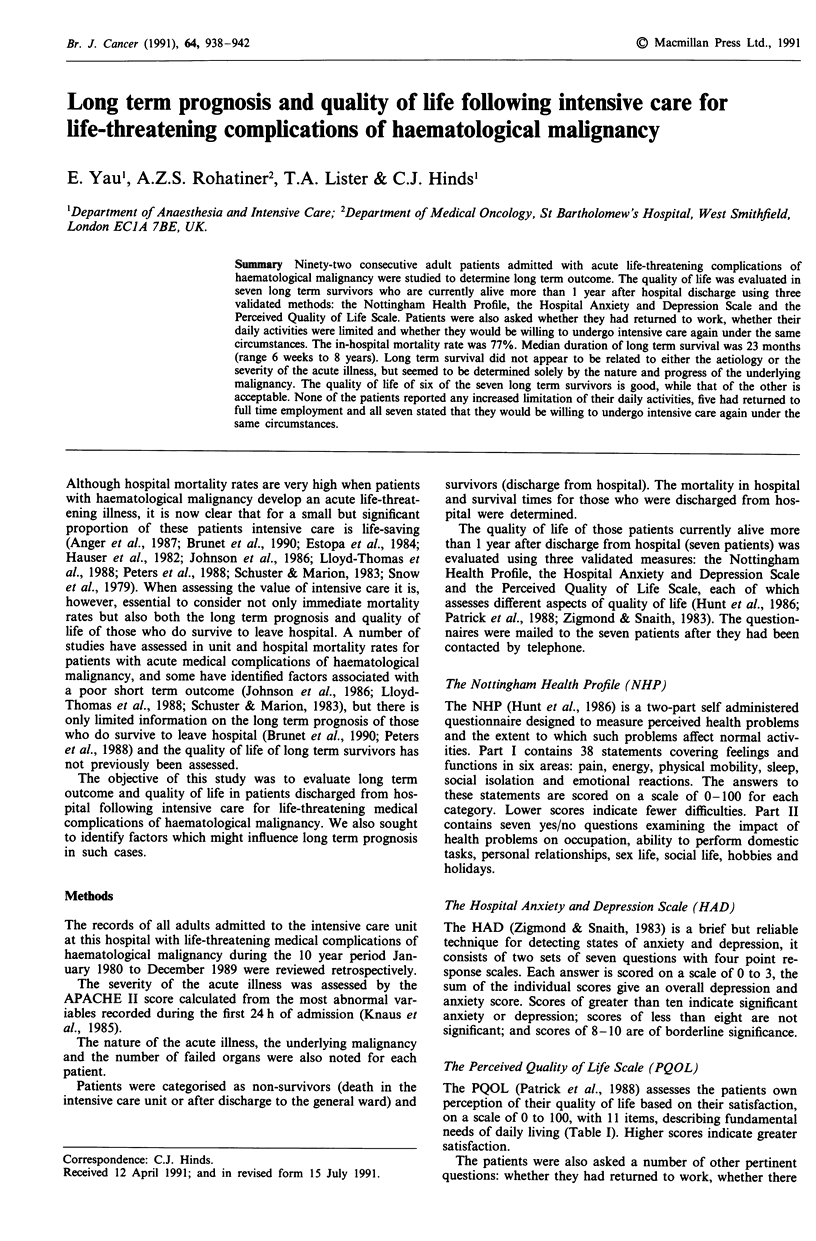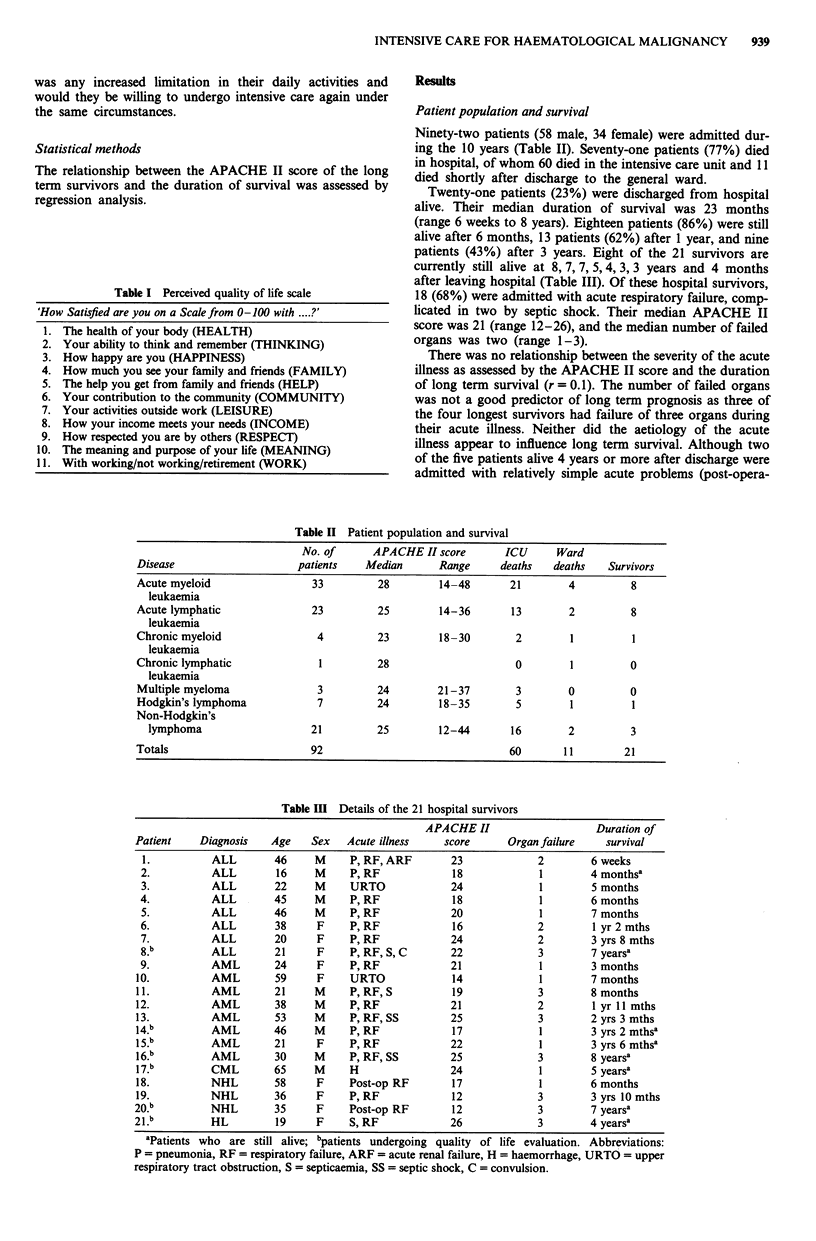Abstract
Ninety-two consecutive adult patients admitted with acute life-threatening complications of haematological malignancy were studied to determine long term outcome. The quality of life was evaluated in seven long term survivors who are currently alive more than 1 year after hospital discharge using three validated methods: the Nottingham Health Profile, the Hospital Anxiety and Depression Scale and the Perceived Quality of Life Scale. Patients were also asked whether they had returned to work, whether their daily activities were limited and whether they would be willing to undergo intensive care again under the same circumstances. The in-hospital mortality rate was 77%. Median duration of long term survival was 23 months (range 6 weeks to 8 years). Long term survival did not appear to be related to either the aetiology or the severity of the acute illness, but seemed to be determined solely by the nature and progress of the underlying malignancy. The quality of life of six of the seven long term survivors is good, while that of the other is acceptable. None of the patients reported any increased limitation of their daily activities, five had returned to full time employment and all seven stated that they would be willing to undergo intensive care again under the same circumstances.
Full text
PDF




Selected References
These references are in PubMed. This may not be the complete list of references from this article.
- Anger B., Schmeiser T., Sigel H., Heimpel H. Intensive care therapy for patients with hematological diseases. Haematol Blood Transfus. 1987;30:519–523. doi: 10.1007/978-3-642-71213-5_91. [DOI] [PubMed] [Google Scholar]
- Brunet F., Lanore J. J., Dhainaut J. F., Dreyfus F., Vaxelaire J. F., Nouira S., Giraud T., Armaganidis A., Monsallier J. F. Is intensive care justified for patients with haematological malignancies? Intensive Care Med. 1990;16(5):291–297. doi: 10.1007/BF01706352. [DOI] [PubMed] [Google Scholar]
- Crawford S. W., Schwartz D. A., Petersen F. B., Clark J. G. Mechanical ventilation after marrow transplantation. Risk factors and clinical outcome. Am Rev Respir Dis. 1988 Mar;137(3):682–687. doi: 10.1164/ajrccm/137.3.682. [DOI] [PubMed] [Google Scholar]
- Cullen D. J., Ferrara L. C., Briggs B. A., Walker P. F., Gilbert J. Survival, hospitalization charges and follow-up results in critically ill patients. N Engl J Med. 1976 Apr 29;294(18):982–987. doi: 10.1056/NEJM197604292941805. [DOI] [PubMed] [Google Scholar]
- Detsky A. S., Stricker S. C., Mulley A. G., Thibault G. E. Prognosis, survival, and the expenditure of hospital resources for patients in an intensive-care unit. N Engl J Med. 1981 Sep 17;305(12):667–672. doi: 10.1056/NEJM198109173051204. [DOI] [PubMed] [Google Scholar]
- Estopa R., Torres Marti A., Kastanos N., Rives A., Agusti-Vidal A., Rozman C. Acute respiratory failure in severe hematologic disorders. Crit Care Med. 1984 Jan;12(1):26–28. doi: 10.1097/00003246-198401000-00007. [DOI] [PubMed] [Google Scholar]
- Hauser M. J., Tabak J., Baier H. Survival of patients with cancer in a medical critical care unit. Arch Intern Med. 1982 Mar;142(3):527–529. [PubMed] [Google Scholar]
- Johnson M. H., Gordon P. W., Fitzgerald F. T. Stratification of prognosis in granulocytopenic patients with hematologic malignancies using the APACHE-II severity of illness score. Crit Care Med. 1986 Aug;14(8):693–697. doi: 10.1097/00003246-198608000-00006. [DOI] [PubMed] [Google Scholar]
- Knaus W. A., Draper E. A., Wagner D. P., Zimmerman J. E. APACHE II: a severity of disease classification system. Crit Care Med. 1985 Oct;13(10):818–829. [PubMed] [Google Scholar]
- Lloyd-Thomas A. R., Wright I., Lister T. A., Hinds C. J. Prognosis of patients receiving intensive care for lifethreatening medical complications of haematological malignancy. Br Med J (Clin Res Ed) 1988 Apr 9;296(6628):1025–1029. doi: 10.1136/bmj.296.6628.1025. [DOI] [PMC free article] [PubMed] [Google Scholar]
- Patrick D. L., Danis M., Southerland L. I., Hong G. Quality of life following intensive care. J Gen Intern Med. 1988 May-Jun;3(3):218–223. doi: 10.1007/BF02596335. [DOI] [PubMed] [Google Scholar]
- Peters S. G., Meadows J. A., 3rd, Gracey D. R. Outcome of respiratory failure in hematologic malignancy. Chest. 1988 Jul;94(1):99–102. doi: 10.1378/chest.94.1.99. [DOI] [PubMed] [Google Scholar]
- Schuster D. P., Marion J. M. Precedents for meaningful recovery during treatment in a medical intensive care unit. Outcome in patients with hematologic malignancy. Am J Med. 1983 Sep;75(3):402–408. doi: 10.1016/0002-9343(83)90340-6. [DOI] [PubMed] [Google Scholar]
- Snow R. M., Miller W. C., Rice D. L., Ali M. K. Respiratory failure in cancer patients. JAMA. 1979 May 11;241(19):2039–2042. [PubMed] [Google Scholar]
- Thibault G. E., Mulley A. G., Barnett G. O., Goldstein R. L., Reder V. A., Sherman E. L., Skinner E. R. Medical intensive care: indications, interventions, and outcomes. N Engl J Med. 1980 Apr 24;302(17):938–942. doi: 10.1056/NEJM198004243021703. [DOI] [PubMed] [Google Scholar]
- Turnbull A. D., Carlon G., Baron R., Sichel W., Young C., Howland W. The inverse relationship between cost and survival in the critically ill cancer patient. Crit Care Med. 1979 Jan;7(1):20–23. doi: 10.1097/00003246-197901000-00005. [DOI] [PubMed] [Google Scholar]
- Wanzer S. H., Adelstein S. J., Cranford R. E., Federman D. D., Hook E. D., Moertel C. G., Safar P., Stone A., Taussig H. B., van Eys J. The physician's responsibility toward hopelessly ill patients. N Engl J Med. 1984 Apr 12;310(15):955–959. doi: 10.1056/NEJM198404123101505. [DOI] [PubMed] [Google Scholar]
- Zigmond A. S., Snaith R. P. The hospital anxiety and depression scale. Acta Psychiatr Scand. 1983 Jun;67(6):361–370. doi: 10.1111/j.1600-0447.1983.tb09716.x. [DOI] [PubMed] [Google Scholar]



